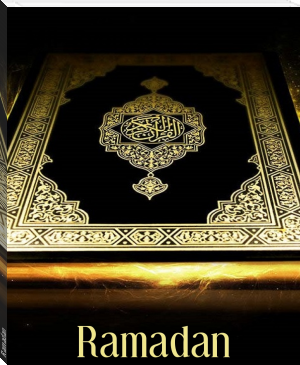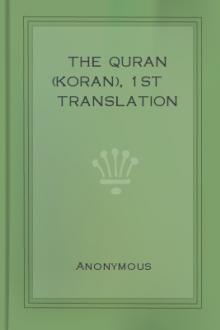Ramadan - Mii Ryouma (manga ereader txt) 📗

- Author: Mii Ryouma
Book online «Ramadan - Mii Ryouma (manga ereader txt) 📗». Author Mii Ryouma
In short, fasting can promote healthier guts, which in turn can improve our immune system and digestive processes, allowing us to potentially live longer.
4. Killing Cancer Cells:
Fasting has been shown to kill cancer cells. Researchers from UT Southwestern in Dallas, Texas, reported that intermittent fasting inhibited the development and progression of the most common type of childhood leukaemia. Another study, this time carried out at the University of Southern California, reported that fasting, when combined with chemotherapy, stripped away the guard that protected breast cancer and skin cancer cells, thus allowing the body’s immune system to more effectively tackle the cancer. Other published research has shown that combining fasting with chemotherapy makes the therapy more effective.
In short, fasting can help the body fight cancerous cells, as well as slowing their progression and development.
5. Increasing Willpower:
Professor Roy Baumeister of Florida State University has spent a significant amount of time researching both self-esteem and self-control/willpower. Perhaps surprisingly, he has found that it is willpower that is more important to happiness and success than self-esteem. His Strength Model of Self-Control likens willpower to a muscle that can get stronger with exercise. Using this model, Baumeister and his colleagues have found that individuals who dedicate some time to improving their “self-control muscle” see a whole raft of benefits, some expected and others less so. By having participants engage in self-control improvement programmes, researchers have found that individuals consume less nicotine and caffeine, manage their emotions better, carry out more chores, spend less impulsively, eat less junk food and spend more time studying too. Their research found that self-control can be improved, and significantly, improving self-control in one area (e.g. abstaining from food and drink) led to improvements in other areas (e.g. emotional control, financial habits, or time management).
Researchers have used the strength-model of self-control to find that stronger willpower can also help individuals act in ways that are pro-social. Psychologist Nathan De Wall reported that individuals whose willpower was intact were more likely to help a stranger, donate money to a sick child and give food to a homeless person. Improving our willpower strength can be a useful way in increasing our compassionate behaviours.
More famously, psychologist Walter Mischel’s Marshmallow Test is a seminal study that highlighted the benefits of having strong willpower. Mischel’s tasty experiment put children in the hot-seat, presenting them with one marshmallow that could be eaten immediately, or they could choose to wait for a number of minutes, after which they could have two marshmallows. This study got very interesting when the researchers followed up with the children later in life. They found that the children who were able to resist the urge to eat the single marshmallow, and so delay their gratification for a bigger, later reward, were less likely to be on the wrong side of the law, obese, users of drugs, while also being more likely to have higher levels of academic achievement, have better relationships, to be more competent, and to be healthier, both physically and psychologically.
A huge volume of scientific research now exists that highlights just how important strong self-control is to success, happiness and quality of life.
In short, fasting can improve our willpower, which in turn can help us in a range of behavioural, physical and psychological outcomes including academic success, relationship health, eating habits, spending behaviour, prosocial and compassionate acts, management of our emotions, and psychological wellbeing.
Tamim Mobayad
Ph.D. in Psychology
TO NON-MUSLIMS: What is Ramadhan?
All you need to know: What is Ramadan and why do Muslims fast all day?
All your questions about Ramadan — the month of intense prayer, dawn-to-dusk fasting and nightly feasts for millions of Muslims — answered.
By: AP
Millions of Muslims around the world mark the start of Ramadan — a month of intense prayer, dawn-to-dusk fasting and nightly feasts. Here's a look at some questions and answers about Islam's holiest month:
Why do Muslims fast?
The fast is intended to bring the faithful closer to God and to remind them of the suffering of those less fortunate. Muslims often donate to charities during the month and feed the hungry.
Fasting is an exercise in self-restraint. It's seen as a way to physically and spiritually detoxify by kicking impulses like morning coffee, smoking and midday snacking.
Ramadan is a time to detach from worldly pleasures and focus on one's prayers. Many Muslims dress more conservatively during Ramadan and spend more time at the Masjid (mosque) than at any other time of the year.
Fasting during Ramadan is one of the five pillars of Islam, along with the Muslim declaration of faith, daily prayer, charity, and performing the hajj (pilgrimage) in Makah.
How do Muslims fast?
Observant Muslims abstain from eating and drinking from dawn to dusk for the entire month of Ramadan, with a single sip of water or a puff of a cigarette considered enough to invalidate the fast.
Muslim scholars say it's not enough to just avoid food and drinks during the day, though. Spouses must abstain from sexual intercourse during the day, and Muslims should not engage in road rage, cursing, fighting or gossiping.
Muslims are also encouraged to observe the five daily prayers on time and to use their downtime just before breaking their fast at sunset to recite Quran and intensify remembrance of God.
To prepare for the fast, Muslims eat what is commonly called "suhoor," a pre-dawn meal of power foods to get them through the day.
How do Muslims break their fast?
Muslims traditionally break their fast like the Prophet Muhammad did some 1,400 years ago, with a sip of water and some dates at sunset. That first sip of water is by far the most anticipated moment of the day.
After a sunset prayer, a large feast known as "iftar" is shared with family and friends. Iftar is a social event as much as it is a gastronomical adventure. Across the Arab world, juices made from apricots are a staple at Ramadan iftars. In South Asia and Turkey, yogurt-based drinks are popular.
Across the Muslim world, mosques and aid organizations set up tents and tables for the public to eat free iftar meals every night of Ramadan.
Can Muslims be exempted from fasting?
Yes. There are exceptions for children, the elderly, the sick, women who are pregnant or menstruating and people traveling, which could include athletes during tournaments.
Many Muslims, particularly those who live in the U.S. and Europe, are accepting and welcoming of others around them who are not observing Ramadan. They also are not expecting shorter work hours, as is the case in the public sector across much of the Arab world during Ramadan.
However, non-Muslims or adult Muslims who eat in public during the day can be fined or even jailed in some Middle Eastern countries, such as Saudi Arabia and the United Arab Emirates, home to large Western expat populations in Dubai and Abu Dhabi.
Meanwhile, minority Chinese Uighur Muslims complain of heavy restrictions by the Communist Party, such as bans on fasting by party members, civil servants, teachers and students during Ramadan, as well as generally enforced bans on children attending mosques, women wearing veils and young men growing beards.
What are some Ramadan traditions?
Typically, the start of the month is welcomed with greetings such as "Ramadan mubarak!" Another hallmark of Ramadan is nightly prayer at the mosque among Sunni Muslims called "taraweeh."
In Egypt, a common sight during Ramadan is a lantern called the "fanoos," which is often the centerpiece at an iftar table and can be seen hanging in window shops and balconies.
In the Arabian Gulf countries, wealthy sheikhs hold "majlises" where they open their doors for people to pass by all hours of the night for food, tea, coffee and conversation.
Increasingly common are Ramadan tents in five-star hotels that offer lavish and pricey meals from sunset to sunrise. While Ramadan is a boon for retailers in the Middle East and South Asia, critics say the holy month is increasingly becoming commercialized.
Scholars are also disturbed by the proliferation of evening television shows during Ramadan. In the Arab world, monthlong soap operas starring Egypt's top actors rake in millions of dollars in advertising.
How do Muslims mark the end of Ramadan?
The end of Ramadan is marked by intense worship as Muslims seek to have their prayers answered during "Laylat al-Qadr" or "the Night of Destiny." It is on this night, which falls during the last 10 nights of Ramadan, that Muslims believe that God sent the Angel Gabriel to the Prophet Muhammad and revealed the first versus of the Quran.
Some devout Muslims go into reclusion those final days, spending all of their time in the masjid.
The end of Ramadan is celebrated by a holiday called Eid al-Fitr. Children often receive new clothes, gifts and cash.
Muslims attend early morning Eid prayers the day after Ramadan. People usually spend the day at parks and visiting friends and families.
How to Receive Ramadhan?
Islamweb.net
Muslims should not neglect the seasons of worship; rather, they must be among the first to excel in and compete in them. Allah The Almighty Says (what means): {So for this let the competitors compete.}[Quran 83:26]
So, we must try our best to receive the month of Ramadan in the following recommended ways:
The first way:
Supplicate Allah The Almighty to keep you alive and in good health until Ramadan comes so that you will be able to actively worship Allah The Almighty. The righteous predecessors used to supplicate Allah The Almighty to let them live until the coming of Ramadan and to accept it from them. At the sighting of the new moon, supplicate Allah The Almighty saying: "O Allah, let this moon come to us with security and faith; with safety and Islam; and guidance to what You love and approve. My Lord and your Lord is Allah."
The second way:
Thanking Allah The Almighty for attending this month. It is recommended for the person who experiences an obvious favor or is protected from an obvious curse that he prostrates in gratefulness to Allah The Almighty or praises Him duly. Among the greatest blessings Allah The Almighty grants people is guiding them to obedience and worship. When Ramadan comes and the Muslim is in good health, this is a great blessing worthy of thankfulness and it requires the praise of Allah The Almighty Who bestows it. All perfect and continuous praise be to Allah The Almighty as suits the majesty of His Face and His Great Authority.
The third way:
Happiness and joy. The Prophet, sallallaahu 'alayhi





Comments (0)